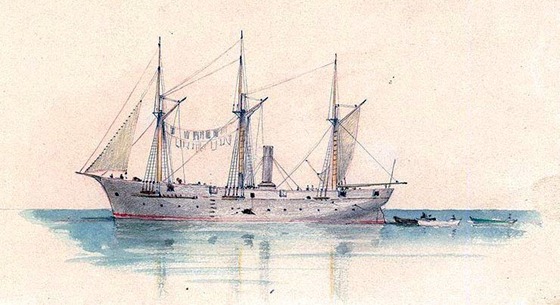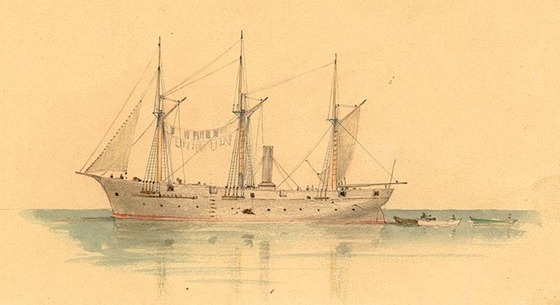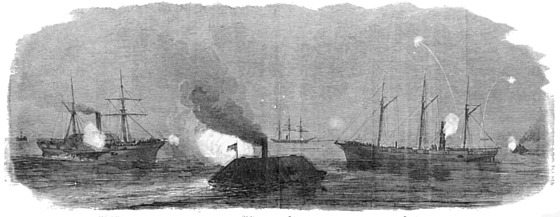Saturday, 31st.—Cannonading up the river again this morning. Gunboats moved down little nearer city.
January 2013
Saturday, 31st—Details sent out to get all the provisions possible and return by 12 o’clock. I went to town, but did not get my horse shod, met the command as I went out, coming in. Went some ten or eleven miles and camped on creek on steep hillside. Rained all night. T and John Henry slept dry in my Yankee tent. Most Company got into stable and crib.
The Rebel Rams Engaging our Blockading Fleet off Charleston, South Carolina, January 31, 1863.—Sketched by an Occasional Correspondent.
xxx
IN our last we announced, on the strength of rebel telegrams to Richmond, which had found their way into the New York Herald, that the rebel rams at Charleston had attacked our blockading fleet off Charleston, and destroyed the Mercedita. We have since received a sketch of the affair from an occasional correspondent, which we reproduce on page 117, and subjoin the following reliable account of the transaction:
It appears from the statement of an intelligent eye-witness that the cause of this attack of the rebel rams on our squadron was owing to the capture of the Princess Royal, the captain and pilot of that vessel having escaped ashore during the darkness of the night, and communicated intelligence to the enemy.
The Princess Royal endeavored to run the blockade by way of Beach Inlet on the 29th ult., but was discovered by the pilot-boat Blunt. On signal being given the Unadilla proceeded toward her, and captured the prize without other assistance. It was then discovered that the captain and pilot had succeeded in getting ashore by a small boat, carrying important dispatches to the rebel Government. The Unadilla carried her to the side of the Housatonic, and lay there till daylight, when a thunder of guns was heard, accompanied by sharp flashes of fire. It was supposed that our fleet was engaged in making, or the Alabama or Florida were endeavoring to force, an entrance. At daybreak two rebel iron-clads were seen coming down from the direction of Stone Inlet toward our fleet.
They attacked the Mercedita first. One ram struck her on the water ridge, keeling her over, and at the same time firing a shot, which entered one of her boilers, causing the death of three persons, including a gunner, by a shot and steam. The ram then hailed the Mercedita, and Captain Stellwagen lowered one of his small boats, after leaving one of the plugs out, allowing the water to enter it. The ram answered our hail by replying, “Confederate ram Palmetto State. Do you surrender?” This was repeated three times, Captain Stellwagen replying at each inquiry, “I am in a sinking condition.” The rebels answered, “God damn you to hell, if you don’t surrender we will blow you out of water. Send your boat aboard.”
The boat which Captain Stellwagen lowered then conveyed his lieutenant (executive officer) to the side of the rebel ram, and the officer asked to be admitted on board. This was refused. The lieutenant then repeated Captain Steliwagen’s statement that “we are in a sinking condition.” The rebel officer replied, “You can’t sink lower than the rails; we can not take you aboard.” The officer then gave his parole, as demanded, and returned to his ship. The rebels were thus successfully deceived as to the condition of the Mercedita, thinking she was in a sinking condition. She lay in shoal water, and hence their reply that “she could not sink lower than her rails.”
The ram then steamed toward the Keystone State, and sent a shot through her steam drum, causing the death of twenty-one persons—twelve by the shot and nine by being scalded by steam. Fifteen were wounded, and are lying at Port Royal, some in a precarious condition. In the mean time the United States gun-boat Housatonic engaged the other ram, driving her away. At half past six o’clock in the morning both rams left the scene and proceeded up to Charleston.
During this attack on our fleet, the Princess Royal, which lay near the Housatonic, and was the chief object of contest on both sides, succeeded in getting off, mainly through the energies of Third Assistant Engineer Thurston, who piled into her fires all the inflammable material at hand.
31st.—We are in statu quo, and our armies quiet. The Northern army seems to be in commotion. Burnside has resigned, and “fighting Joe Hooker” has been put in his place. Sumner and Franklin have also resigned their “grand divisions.” Pourquoi ? Won’t the men advance?Perhaps the Stafford mud has been more than a match for them. Burnside had issued but a few days ago an address to his men, saying they were about to “strike the final blow at the rebellion.” All was in readiness, and the “Grand Army” moved forward; just then the ” rain descended and the floods came,” and, attempting to cross the Rappahannock ten miles above Fredericksburg, ambulances, wagons, big guns and all stuck in the mud; the order, “To your tents, O Israel,” had to be given, and the “rebellion” still flourishes.
Jan. 31st. Saturday. We went to Camp Cleveland and saw the boys. Then to Auntie Jones’ to dinner. Down to Alfred’s, Mattie’s and back to Uncle’s. Then with Thede went to see Lizzie Cobb. Not at home. Called on Mrs. H. Cobb. A pleasant time. Off at 6:45. C. G. at the depot. Put up at the National for the night.
Washington Saturday Jan’y 31st 1863
The month of Jan’y has passed away and in looking back I find matters connected with the War in much the same condition they were in a month ago. It seems no nearer a close, but on the whole I think matters look more bright for us generaly. The Rebels through their papers repudiate all ideas of our Peace men at the North as to a “re-construction of the Union.” Nothing Short of entire Independence on their part will bring peace. Well, it seems [to] be a question of endurance, and we will see who can stand it the longest. We are expecting successes now and nothing else, two or three victories would do wonders for us during the next month, as many defeats would ruin us. I think we are pretty well prepared for the former. An immense force must now be near Vicksburgh and we are expecting to hear of a terrible fight there soon. Genl Grant is in command. I have been in the office as usual today. After dinner I called upon Vanmaster and staid an hour and then attended a meeting at Mr Sweatlands rooms convened to make arrangements for a Musical Concert to come off next week for the benefit of the NY Soldiers. P H Ostrander is the active man in the affair. Nothing of importance in the way of news. Congress is squabling over the Negro Regiment Bill. Gold 1.58 today. It is speculation, a sort of [“Morus Multicaulus”?] fever that is raging. Genl Benj F Butler is at the “National.” Many other celebrities are are [sic] in town. Called at Charleys rooms. “Sallie” is quite ill. The baby Jessie sucks her thumb and grows fat.
Saturday, 31st—A scouting party of about two hundred men mounted on horses and mules, and carrying one piece of light artillery, came upon a rebel camp some eighteen miles out and engaged in a fierce fight. After standing their ground for two hours the rebels left for the tall timber. They left their supplies to our men, who burned all that they could not bring with them, and returned to camp with only five or six men wounded, bringing one lone prisoner.
The USS Mercedita, involved in The Fight off Charleston.
Image digitally adjusted for fade; original image from Naval Historical Center below.
JANUARY 31ST.—We have dispatches from Charleston, to-day, which reconcile us to the loss of the cargo captured by the blockading squadron early in the week. An artillery company captured a fine gun-boat in Stone River (near Charleston) yesterday evening. She had eleven guns and 200 men.
But this morning we did better still. Our little fleet of two iron-clads steamed out of Charleston harbor, and boldly attacked the blockading fleet. We crippled two of their ships, and sunk one, completely raising the blockade, for the time being. This will frustrate some of their plans, and may relieve Wilmington.
The attack on Fort McAlister was a failure. The monitor which assaulted the fort sustained so much injury, that it had to retire for repairs.
Several blockade-runners between this and Williamsburg were arrested and sent to Gen. Winder to-day by Lieut. G. D. Wise. Gen. W. sent them to Gen. Rains. Mr. Petit and Mr. James Custis (from Williamsburg) came with them to endeavor to procure their liberation. Gen. Rains sent them back to Gen. W., with a note that he had no time to attend to such matters. Such business does not pertain to his bureau. I suppose they will be released.
Major Lear, of Texas, who was at the capture of the Harriet Lane, met on the captured steamer his mortally-wounded son, the lieutenant.
A few days ago, Lieut. Buchanan was killed on a United States gun-boat by our sharpshooters. He was the son of Admiral Buchanan, in the Confederate service, now at Mobile. Thus we are reminded of the wars of the roses—father against son, and brother against brother. God speed the growth of the Peace Party, North and South; but we must have independence.
Mr. Hunter was in our office to-day, getting the release of a son of the Hon. Jackson Morton, who escaped from Washington, where he had resided, and was arrested here as a conscript. The Assistant Secretary of War ruled him entitled to exemption, although yesterday others, in the same predicament, were ruled into the service.












